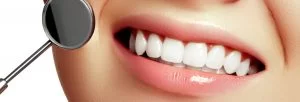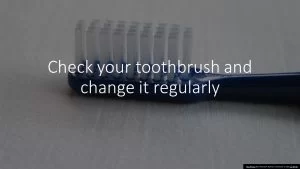At Knighton Dental, we pride ourselves on providing our patients with the best advice and oral hygiene techniques to help them look after their oral health at home. Since the outbreak of Covid-19, sadly, we have not been able to offer you this service.
We are writing this blog to help you improve your oral health and hygiene at home.
Have you noticed that your gums are bleeding when you brush?
Bleeding gums indicate that the gum is irritated – this is usually caused by ineffective brushing. If you look closely at the site of the bleeding, you may notice that the gum is red and puffy. You may also notice plaque (a soft white film); in some cases, this may have hardened and become tartar. This is usually presented along the gum line and/or between the teeth and is a sign of ineffective brushing.
To address this situation, there are a few things that you will need to look at.
The toothbrush – the bristles of your toothbrush should not be splayed; if they are, you will need to change the brush head or purchase a new brush. The bristles should be soft for both manual or electric brushes to allow the bristles to flex around the teeth and effectively remove the plaque.

The brushing technique – when brushing, you should make sure to brush every surface of each tooth. It is recommended to work in sections to make sure you don’t miss any areas.
Hold the head of the toothbrush horizontally against your teeth with the bristles part-way on the gums and tilt the brush head to a 45-degree angle so the bristles are pointing under the gum line. Move the brush in small circular motions to allow the bristles to slide gently under the gum, making sure to spend 3-5 seconds on each tooth. For the insides of your front teeth, where the horizontal brush position is troublesome, hold the brush vertically instead—this time, using a gentle back-and-forth brushing action finished by a small circular motion. To clean the biting or chewing surfaces of the teeth, hold the brush so the bristles are straight down on the flat surface of the molars. Gently move the brush back and forth and/ or in small circular motions.
If you are using an electric toothbrush, you should use the same technique, but instead of creating small circular motions, you should hold the toothbrush in place and let the brush do all the work.
You can clear even more bacteria from your mouth by brushing your tongue. With your toothbrush, brush firmly but gently from back to front or use a tongue cleaner that you can find at most pharmacies. Do not go so far back in your mouth that you gag.
The bleeding you are experiencing should subside within 2-3 weeks once you improve your oral hygiene by following the above instruction.

Cleaning between the teeth – cleaning between the teeth is just as important as brushing your teeth. To clean between the teeth, we need to use either floss or interdental brushes (e.g. TePe brushes).
At Knighton Dental, we recommend using waxed ‘tape’ floss as it helps the floss to slide between the teeth, and the width of the tape aids the removal of plaque.
When flossing, you should wrap each side of the floss around your index fingers and, using your thumbs and middle fingers, gently ease the floss between the teeth and slightly underneath the gum. Once between the teeth, create a ‘C’ shape using floss so that the floss is hugging around the edge of the tooth, then flick the floss out of the gap, removing the plaque. Move slightly along the floss to a clean section and re-enter the same gap, again going slightly under the gum and again creating a ‘C’ shape on the next tooth.
E.g. O>
Here the ‘O’ represents the tooth, and the ‘<’ and ‘>’ represents how the floss should cup around the teeth.
Before using interdental brushes (TePe brushes), you should look at the size of the gap you have between the teeth at the gum level (they appear as small black triangles); if you have large gaps, you will need larger brushes, if you have small gaps you should use smaller brushes. Many people have different-sized gaps throughout the mouth and thus need a variety of brushes.
Insert the brush into the space between teeth at gum level, turning slightly as you insert.
This technique aids access and prolongs the life of the brush. Once inserted, gently move the brush backwards and forwards a few times on either side of the gap to remove plaque and debris. Between each insertion, rinse clean with water or wipe clean with a tissue.
Back to blogWe are proud to help our valued patients to transform their smiles through a wide choice of general and cosmetic dental treatments.
Our TreatmentsWe ensure an exceptional patient journey – from start to finish.
learn moreDelivering life-changing smiles and ensuring excellent dental health.
learn moreDental implants and us – together we can recreate a naturally beautiful smile.
learn more